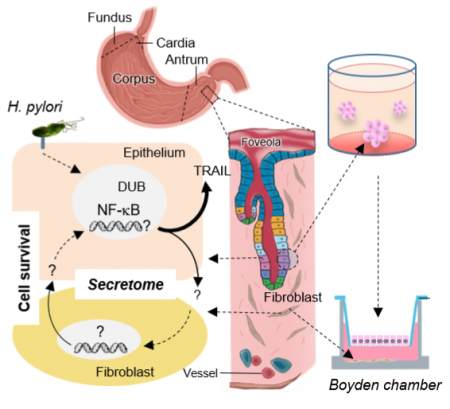P1-3: Regulation of NF-kB by deubiquitinylases in the Helicobacter pylori infected gastric mucosa
Sahar EmamiPhD Student
Michael NaumannProject Leader |
The human pathogen Helicobacter pylori is a risk factor for gastric diseases including gastric cancer. H. pylori colonizes the gastric epithelium and the disease-promoting microenvironment involve, e.g. subepithelial fibroblasts. The H. pylori-induced transcription factor nuclear factor kappa-light-chain-enhancer of activated B cells (NF‑kB) is involved in the pro-inflammatory response and cell survival in the gastric mucosa, and represents a trailblazer of gastric pathophysiology. In order to identify suitable therapeutic targets and diagnostic markers for the prevention and treatment of chronic gastric diseases, we plan to identify intra- and intercellular signaling mechanisms promoting a maladaptive response at the epithelial gastric barrier. These studies will scrutinize the role of NF-κB (cooperation Projects: P1-2, P13-2, P15-2), deubiquitinylases (DUBs), and modulation of protein-expression via the ubiquitin-proteasome system. DUBs, such as USP48, are often dysregulated in gastrointestinal diseases, promoting maladaptive processes in the gastric mucosa. Therefore, the impact of DUBs on maladaptive processes in the gastric mucosa (microenvironment) will be investigated by co-culture of gastric monolayer organoids and fibroblasts in the Boyden chamber and in microfluidic devices. Moreover, we will analyze the crosstalk of different DUBs in context of NF-κB and other stress-response pathways (e.g. JNK) in the infected mucosa.
|
Photos: by UMMD, Melitta Schubert/Sarah Kossmann








